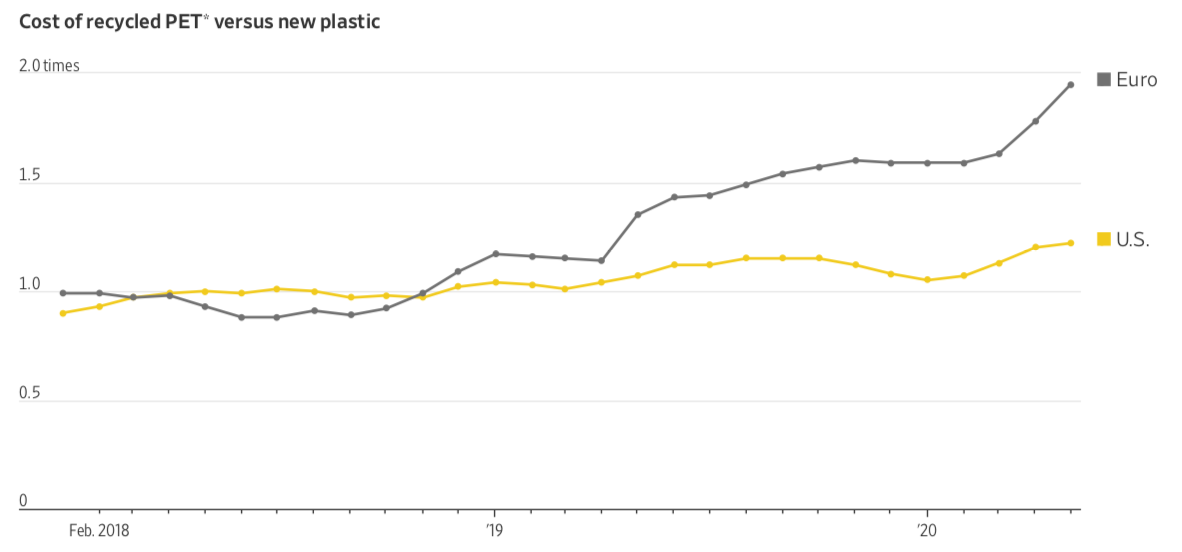14 Jul 2020 Covid-19 has led to a surge in consumption of single-use, virgin plastic
Consumption of plastic destinated for single-use items, especially personal protective equipment, has grown dramatically in the last months due to COVID19. This phenomenon has been worsened by lockdown-driven behaviors and the oil price crash which has made recycled plastic more expensive.
While overall plastic demand is expected to fall this year due to the decrease in sales of cars, electronic appliances and construction activity, consumption of plastic destinated for single-use items has grown drastically during the last months due to the coronavirus pandemic. International Solid Waste Association (ISWA) estimates that the consumption of single-use plastic has surged by 200-300% in America only. This phenomenon is mostly due to the demand for masks, gloves and other personal protective equipment, often based on synthetic substances derived from fossil fuels.
While environmentalists are afraid of setbacks in the battle against plastic, Egyptian petrochemicals group Carbon Holdings CEO, Basil El-Baz, highlights that “single-use plastics are making a comeback and the idea that there is a health element involved in using something once and throwing it away”. Moreover, in spring the pandemic has led to the suspension of anti-plastic regulations, such as a temporary ban on single-use grocery bags in some US States, or the delay by six months to next October of the ban on plastic straws in Britain.
Lockdown also contributed to worsening the situation. Firstly, it favored e-commerce and food home delivery consumption, which are both characterized by a massive use of plastics to wrap the items for delivery. Secondly, it negatively influenced people’s inclination towards recycling, especially due to the fact that municipalities worldwide have reduced their recycling schemes due to fear of contagions.
In addition to this, the pandemic triggered a crash on oil price, which made virgin plastic drastically cheaper to produce, disincentivizing the use of recycled one which has conversely become more expensive. Data from Wood Mackenize show that in Europe recycled plastic costed 95% more than new plastic in May, up from 35% of last year, while in the US the premium has increased from 7% to 22%.

*Type of plastic typically used to make drinks bottles. Source: Wood Mackenzie, through The Wall Street Journal
In the last months, companies in the drinking industry, such as Coca-Cola and Danone, have failed to hit their sustainability targets related to the use of bottles made of recycled plastic (PET), as the pandemic led to the suspension of many recycling programs, reducing supplies and making them even more expensive. Due to this, the Consumer Brands Association in the US (which includes firms such as PepsiCo and Coca-Cola) has proposed to add a fee on virgin plastic to finance recycling programs and consequently make recycled PET less expensive.
Covid-19 has also uncovered vulnerabilities in the global plastic waste management, especially in poor-countries where (already limited) funds have been reallocated from initiatives aimed at tackling plastic pollution to virus-related health programs. This means that most of the plastic waste produced this year will be either incinerated or stored in landfill sites, which in most cases are simply open dumps. Both options create negative externalities as burning plastic releases toxins and significant levels of nano- and micro-plastics, leading to air and water pollution, and landfills are among the responsible for plastic leakages into oceans. The poor will be the ones hit the hardest by plastic pollution as 93% of plastic waste in low-income countries is disposed of in open dumps. In rich countries, instead, the poor are more likely to be the ones living in proximity to waste facilities.
For further information, see the following links:
- https://www.wsj.com/articles/how-the-coronavirus-complicated-the-quest-for-a-greener-plastic-bottle-11593005945
- https://www.ft.com/content/bb805101-29cd-4443-b874-d5c0185c4a42
- https://www.nytimes.com/2020/04/24/us/california-plastic-bag-ban-coronavirus.html?searchResultPosition=6
- https://www.ft.com/content/a712bdbc-8be6-48fe-99de-a7ef94f74be8
- https://abc7news.com/california-plastic-bag-ban-are-reusable-bags-allowed-grocery-stores-during-covid-gavin-newsom/6262327/
- https://www.economist.com/international/2020/06/22/covid-19-has-led-to-a-pandemic-of-plastic-pollution
